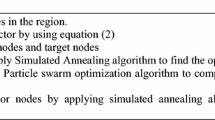Abstract
In this paper we consider Maximal Lifetime Coverage Problem in Wireless Sensor Networks which is formulated as a scheduling problem related to activity of sensors equipped at battery units and monitoring a two-dimensional space in time. The problem is known as an NP-hard and to solve it we propose two heuristics which use specific knowledge about the problem. The first one is proposed by us stochastic greedy algorithm and the second one is metaheuristic known as Simulated Annealing. The performance of both algorithms is verified by a number of numerical experiments. Comparison of the results show that while both algorithms provide results of similar quality, but greedy algorithm is slightly better in the sense of computational time complexity.
Similar content being viewed by others
References
Nesamony, S., Vairamuthu, M.K., Orlowska, M.E., Sadiq, S.W.: On sensor network segmentation for urban water distribution monitoring. In: Zhou, X., Li, J., Shen, H.T., Kitsuregawa, M., Zhang, Y. (eds.) APWeb 2006. LNCS, vol. 3841, pp. 974–985. Springer, Heidelberg (2006). doi:10.1007/11610113_104
Pierce, F.J., Elliott, T.V.: Regional and on-farm wireless sensor networks for agricultural systems in Eastern Washington. Comput. Electron. Agric. 61(1), 32–43 (2008)
Cardei, M., Wu, J.: Energy-efficient coverage problems in wireless ad-hoc sensor networks. J. Comput. Commun. Arch. 29, 413–420 (2006)
Garey, M.R., Johnson, D.S.: Computers and Intractability: A Guide to the Theory of NP-Completeness. W.H. Freeman and Co., New York (1979)
Sahoo, B., Ravu, V., Patel, P.: Observation on using genetic algorithm for extending the lifetime of wireless sensor networks. In: IJCA Special Issue on 2nd National Conference- Computing, Communication and Sensor Network, pp. 9–13 (2011)
Fayyazi, H., Sabokrou, M., Hosseini, M., Sabokrou, A.: Solving heterogeneous coverage problem in Wireless Multimedia Sensor Networks in a dynamic environment using Evolutionary Strategies. In: ICCKE2011, Mashhad, Iran, 13–14 October 2011
Abbasi, M., Abd Latiff, M.S., Modirkhazeni, A., Anisi, M.H.: Optimization of wireless sensor network coverage based on evolutionary algorithm. IJCCN 1(1), 104 (2011)
Gil, J.M., Han, Y.H.: A target coverage scheduling scheme based on genetic algorithms in directional sensor networks. Sensors 11(2), 1888–1906 (2011)
Tretyakova, A., Seredynski, F.: Application of evolutionary algorithms to maximum lifetime coverage problem in wireless sensor networks. In: 27-th IEEE IPDPS, Boston, USA (2013)
Author information
Authors and Affiliations
Corresponding author
Editor information
Editors and Affiliations
Rights and permissions
Copyright information
© 2017 Springer International Publishing AG
About this paper
Cite this paper
Tretyakova, A., Seredynski, F., Guinand, F. (2017). Scheduling Sensors Activity in Wireless Sensor Networks. In: Nguyen, N., Papadopoulos, G., Jędrzejowicz, P., Trawiński, B., Vossen, G. (eds) Computational Collective Intelligence. ICCCI 2017. Lecture Notes in Computer Science(), vol 10448. Springer, Cham. https://doi.org/10.1007/978-3-319-67074-4_43
Download citation
DOI: https://doi.org/10.1007/978-3-319-67074-4_43
Published:
Publisher Name: Springer, Cham
Print ISBN: 978-3-319-67073-7
Online ISBN: 978-3-319-67074-4
eBook Packages: Computer ScienceComputer Science (R0)




